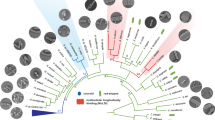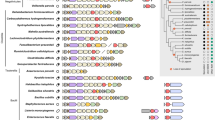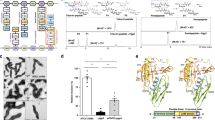Abstract
THE differentiation of pediococci from other groups of spherical lactic acid bacteria has frequently been based on the characteristic morphological arrangement into tetrads1–3. It has been generally assumed that the occurrence of tetrads is attributable to division in two planes1,3. However, some workers4,5 have expressed the view that pediococci divide in one plane only, giving rise to chains similar to those formed by streptococci, and that tetrad formation is due to re-arrangement of 3–4 membered chains.
This is a preview of subscription content, access via your institution
Access options
Subscribe to this journal
Receive 51 print issues and online access
$199.00 per year
only $3.90 per issue
Buy this article
- Purchase on Springer Link
- Instant access to full article PDF
Prices may be subject to local taxes which are calculated during checkout
Similar content being viewed by others
References
Balcke, J., Wschr. Brau., 1, 257 (1884).
Mees, R. H., Diss Lab A.J. Kluyver Delft (1934).
Pederson, C. S., Bact. Rev., 13, 225 (1949).
Shimwell, J. L., and Kirkpatrick, W. F., J. Inst. Brew., 45, 137 (1939).
Rohrer, E., Schweiz. Brauerei Rundsch., 62, 245 (1951).
Author information
Authors and Affiliations
Rights and permissions
About this article
Cite this article
GUNTHER, HL. Mode of Division of Pediococci. Nature 183, 903–904 (1959). https://doi.org/10.1038/183903b0
Issue Date:
DOI: https://doi.org/10.1038/183903b0
Comments
By submitting a comment you agree to abide by our Terms and Community Guidelines. If you find something abusive or that does not comply with our terms or guidelines please flag it as inappropriate.



